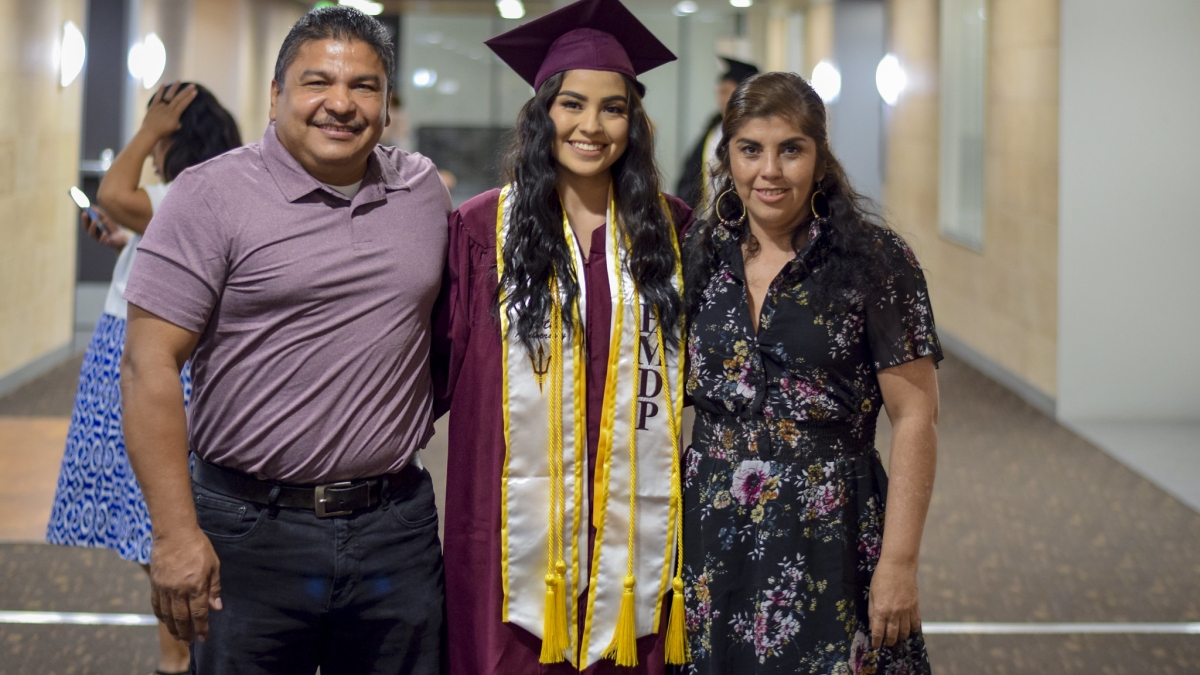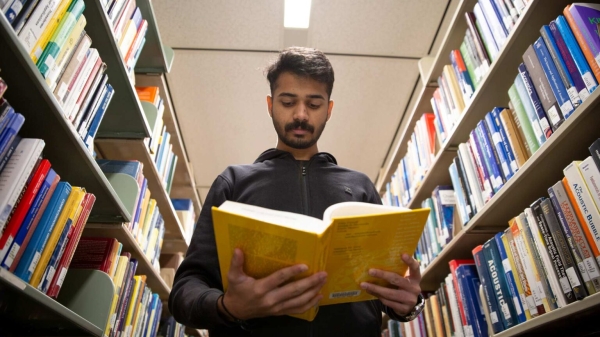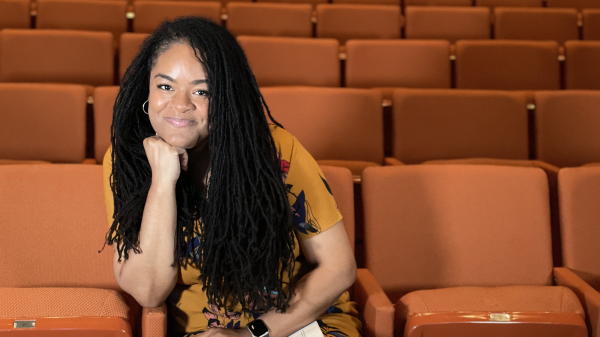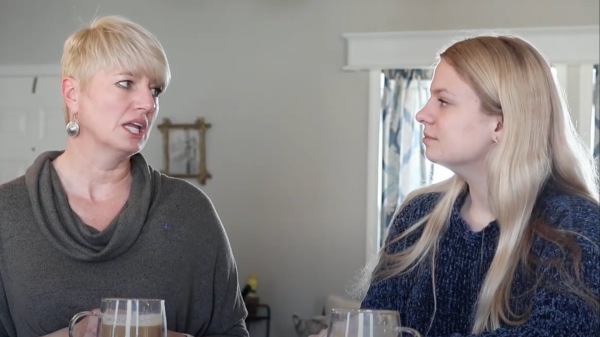Hispanic Mother-Daughter Program celebrates 35 years

From left: Cesar Arevalo, ASU grad Jackelyne Arevalo and Delia Acosta at the 2019 spring Hispanic Mother-Daughter Program graduation celebration.
This spring marks the 35th anniversary of ASU’s Hispanic Mother-Daughter Program that aims to increase the number of first-generation Arizona students who are prepared to enroll and succeed at Arizona State University.
The program was launched in 1984 by Joanne O’Donnell to address the underrepresentation of women and women of color attending ASU. Every year, the program selects hundreds of seventh grade students and family member participant teams — 650 this year alone — to become more familiar with the process of preparing for a college education through activities focused on skill building, mentorship and community-building around higher education. Monthly workshops on ASU’s Tempe campus address topics such as peer pressure, financial aid and preparing for high school. Translators are available for Spanish speakers to make the material more accessible.
The program, which earned Helios Foundation support in 2007, has reached thousands of parent-student teams, and its impact has been significant. The enrollment of resident Latina women at ASU in 1984 was 556. As of fall 2018, that number increased to more than 7,000 Latina students.
The program can have a huge impact on families’ higher education goals. Liliana Campos was a participant when she was in middle school. She enjoyed the program as a student but didn’t complete it after she had her daughter, Briana. She encouraged her daughter to participate when she was old enough.
“It’s a great opportunity ... to continue my daughter’s education,” Campos said.
Her daughter is now a senior at Metro Tech High School in Phoenix, and Campos said she’s noticed how focused her daughter is on college. She has been admitted to ASU and is pursuing a fashion degree starting in the fall. Campos said the most beneficial part of the program for their family has been the community support and confidence to “believe that … it’s possible to get through college.”
“There are so many resources out there. (The mentors) pretty much guide you and give you that support,” she said.
Connecting students with resources and preparing them for the sometimes intimidating processes of higher education is a core component of the program. Leonela Urrutia is a senior at ASU and an alumna of the Hispanic Mother-Daughter Program; she said the program’s financial aid workshops helped her earn a full ride to ASU. She is about to graduate with a political science degree, a minor in French and a certificate in international studies.
Urrutia is also an office assistant and peer adviser for the program, so she works on the daily functions of the workshops and also serves as a presenter, emcee and particpant mentor for the monthly workshops.
She said the program is invaluable because it lets families know that higher education goals are reachable.
“I tell all the students that this program is for them and the resources are right in front of them. If they’re thinking about it they should just take the leap of faith,” Urrutia said. “The program is going to help educate you and your parents or guardians about college and higher education. (These are) goals that are attainable, even though they seem so unrealistic to some.”
Urrutia has seen the program’s effect on her whole family. Her older sister, Katherine, went through the program and attended Grand Canyon University with scholarships. Urrutia said her mom, Glenda, was inspired through the Hispanic Mother-Daughter Program to get a certificate to be a teaching assistant. Her mother now works with a speech pathologist after spending time caregiving and working in the cleaning industry.
“My mom encourages all parents she knows to go through the program,” said Urrutia, who plans on pursuing work with the state legislature advocating for education and immigration equity after she graduates.
Participants and alumni often introduce the program to others, and partnerships with schools and community organizations have also fueled the program’s success over the decades.
Cyndi Tercero, who was awarded the program’s Commitment to Service Award at the recent Hispanic Mother-Daughter Program graduation ceremony on May 1, has been involved in the program for more than 20 years as an educator at Carl Hayden High School and later as an administrator at Phoenix Union High School District.
Tercero saw early on the contributions that the program made to students. A turning point for her was in the mid-1990s when she was at Carl Hayden; Tercero remembers an intelligent young girl in tears because her grandmother told her to “stop the crazy talk about going to college” because her role as a woman in the community was to find a husband.
“Her parents and grandparents were shocked that at the school level we were trying to encourage her to go further on,” she said.
The student was not in the Hispanic Mother-Daughter Program, but some of her friends were.
“I just kept thinking, what a difference the program could have made for her,” she said.
Since then Tercero has served on the former Hispanic Mother-Daughter Program board and been an advocate for higher education for students in Phoenix. She said she’s humbled and honored to receive the award.
“I’ve been so committed to this program. I was not a Hispanic Mother-Daughter Program alum; I didn’t get to experience the program firsthand but I know I got to experience how it impacted many of our students.”
Tercero said that through the program, students and parents all benefit from the mindset that college is an attainable goal, including living on campus and having a full campus experience.
The impact has been felt among a diverse group of students. Although it has retained its original name, the program also embraces participants of diverse ethnic backgrounds, and sons and fathers or other caregivers have also participated. Alumni of the program have gone on to diverse careers, including in broadcast media, financial planning, teaching, nursing and engineering. And the number of teams served is growing to 1,000 annually in the next two years, including an expansion to ASU’s West campus in Glendale.
“It has been so inspiring to see all of the classes of mothers and daughters enter and graduate from this program over the years,” said Anita Verdugo Tarango, director of outreach for ASU Educational Outreach and Student Services. “We are building skills, community and a legacy of higher education for entire families through the Hispanic Mother-Daughter Program, and we’re thrilled to celebrate 35 years of this work at ASU.”
Find out more about the program, including how to apply or support the program, at the Hispanic Mother Daughter Program website.
More Arts, humanities and education

Engineering knowledge: Recommended reading from Fulton Schools faculty, staff
In this 13th edition of the annual Essential Reading feature, 10 more faculty and staff members in the Ira A. Fulton Schools of…

ASU Gammage Scholar and MFA student forges path to her future
Editor’s note: This story is part of a series of profiles of notable spring 2024 graduates. Theater was an escape and an outlet…

Data science student investigates Arizona education system, reform through Steve Jobs Archive fellowship
Arizona State University student Brinlee Kidd was one of nine people across the U.S. chosen for the inaugural Steve Jobs Archive…